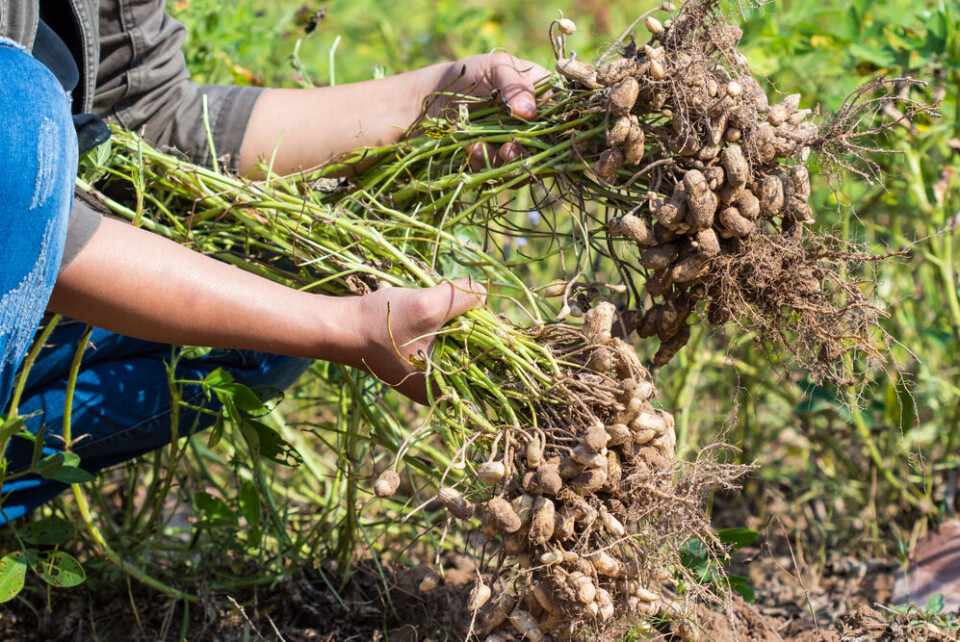-
French farmers give away potatoes due to overproduction
Hundreds of tonnes at risk of going to waste due to drop in demand and excess yield
-
Hungry, peckish, stuffed: 11 French phrases to do with food and eating
These phrases help to talk about one of the most important subjects in France - food
-
‘It’s becoming intolerable’: homeowners in France move north to escape the heat
Heatwaves becoming more regular and intense
Why peanuts and pistachios are the future of French farming
Farmers must grow completely different crops adapted to extreme weather, says scientist

French farmers must change the types of crops they produce if the country is to successfully adapt to climate change, warns an environmental researcher.
Serge Zaka has a PhD in agroclimatology, and is dedicated to popularising scientific concepts, on social media and through public speaking engagements.
He believes France is “20 years behind” in terms of adapting to climate change after decades of inaction.
Peaches and vineyards in Normandy
Farmers regularly adopt different, more resistant varieties of the same crop, but Dr Zaka argues this is no longer enough.
“Either we do nothing, and yields progressively diminish as we’ve seen for wheat, corn and peas in the last 10 years, or we start to prioritise the crops of the future.
“Climates move up from the south. By 2070, the Mediterranean climate should reach Lyon and Bordeaux, and the crops must come with it.
“In the Rhône and Garonne valleys, we’ll see an evolution towards more olives, for example,” he said.
We could even see a growing number of apricot and peach trees in Normandy, while pine trees and vineyards could also move further north, with the climate of south west France expected to climb “almost up to Belgium”.
Read more: Water restrictions not used effectively during France’s drought
African crop, peanuts, in south of France
While northern France will adopt crops already grown in the south, southern regions will have to look overseas, a process that has already begun, he says.
“Pistachios were not present at all, but they have been in the last few years. Why pistachios? Because they flower two weeks later than apricot trees, so in the case of April frost, you avoid losses. They are also more resistant to drought.
“There are also medlar trees, which are ornamental in the south of France, but in Lebanon, Syria or Israel, it’s a dessert fruit.
“The peanut, which is more of an African crop, and the cashew nut, which is more southern European, could also appear.”
Peanuts are already grown on one farm in Soustons (Landes), which is made possible by the area’s sandy soil.

Photo: Dr Serge Zaka has a PhD in agroclimatology, and is dedicated to popularising scientific concepts on social media; Credit: Serge Zaka
Producers saw major losses in 2022 heat
Producers are not the only ones who will have to adapt to the new crops – it means transforming processing industries, storage, and consumption habits.
Farmers are already working together with the aim of creating a quality label for French pistachios in the coming years, Dr Zaka said.
Last year was France’s hottest since records began in 1900, and the second driest since 1959, with Météo France warning that 2022’s temperatures could become the norm by 2050.
Producers saw major losses in everything from olives to honey.
Producers told to get insurance
In April 2021, losses due to a late cold snap were estimated at €4billion in the tree and wine-growing industries, triggering a law change that took effect in January 2023.
Previously, losses due to extreme weather were compensated by a national fund, financed by farmers and the state.
Farmers must now absorb the cost of losses to up to 20% of crops, at which point their insurance will take over. The state will pay for compensation above a threshold of 30% or 50%, depending on the crop.
The aim of the reform is to encourage more farmers to insure their land – in 2022, just 17% of agricultural land was insured.
Farmers who are insured will receive more generous state compensation.
Read more: Drought-hit French department in plea to prevent ‘human catastrophe’
Long-term goals do not appeal to elected presidents
One potential issue is that losses are calculated in relation to the average harvest from the last three to five years, themselves defined by extreme weather.
Dr Zaka believes a more profound change is needed. “If you add up all the compensation paid out over the last 30 years, there could have been new, better-adapted industries 20 years ago.”
He is calling on the state to set long-term goals for switching to new crops, with several billion euros of investment.
“An association of farmers cannot create a sector at a national level. Only the state can.
“The actions that can be taken won’t have an effect within five years, but in dozens of years to come, so they’re not necessarily appealing to presidents.”
Quality of cheese and wine affected
It is not just the quantities produced that will change with the climate, either – the quality will also be affected. That is particularly the case for wine, with the taste intrinsically linked to the local climate.
Winemakers in areas such as Languedoc have already seen the alcohol content in their wines rise by one or two percentage points over the past 30 years.
“When there are heatwaves and a lack of water, the grape berries will not be full of water, meaning the sugar inside will be more concentrated, and the sugar is what creates alcohol.”
Geographical indications such as AOP wines will have to adapt their quality specifications accordingly, Dr Zaka argues.
Read more: Winemakers face new problems each year due to climate change
The same applies to cheese.
“The specifications for salers from the Massif Central state that the cows must live outside and feed on fresh grass. The 2022 droughts were so severe that there wasn’t any grass, and they had to come inside and be given other food. The producers couldn’t sell their milk to be used for AOC salers.”
Agrivoltaic solar panels provide energy and shade
Researchers, meanwhile, are working on technological solutions to the challenges posed by climate change. Precision agriculture, for example, uses data-driven technology to prevent waste, including using only as much water as is necessary for the crops.
Agrivoltaics is also a growing practice in France. It involves installing solar panels on farmland in service of food production.
The panels can provide shade, before tilting when the crops are in need of sunlight.
Lots of small improvements will be needed in the years ahead, Dr Zaka said. “There is no miracle solution.”
Related articles
Eco news: French town paints grass green, €10bn needed for forests
Lavender crops destroyed overnight by caterpillars in south of France
‘Cut your cow numbers to help meet climate commitments’, France told
























